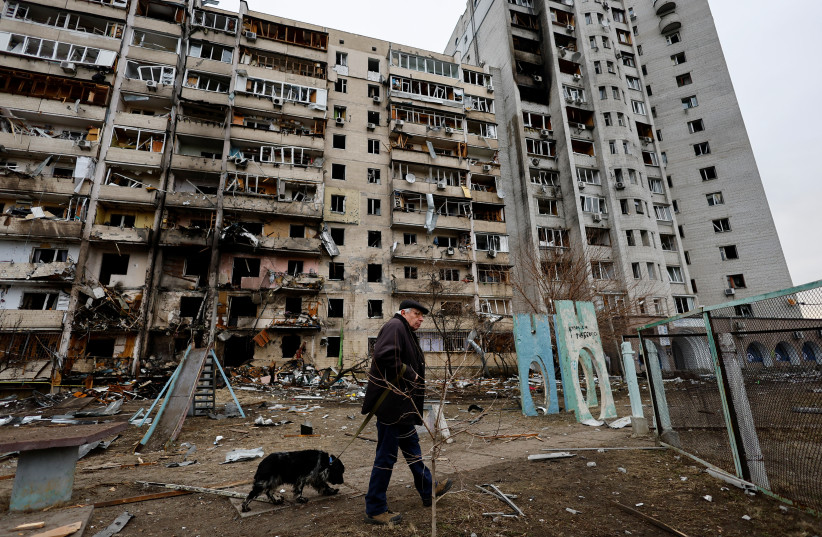The US, Canada, the European Commission, France, Germany, Italy and the United Kingdom agreed on Saturday night to remove a number of Russian banks from the SWIFT global interbank payment system, according to a joint statement issued by the White House.
Additionally, restrictive measures will be imposed on the Russian Central Bank to prevent it from deploying its international reserves in ways that could undermine sanctions.
“Golden passports,” the sale of citizenship, will be limited for Russians connected to the Russian government.
The allies committed to launching a transatlantic task force within the coming week to ensure the effective implementation of the sanctions against Russia, by identifying and freezing the assets of sanctioned individuals and companies.
THE US AND EU
“We stand with the Ukrainian people in this dark hour,” the White House said. “Even beyond the measures we are announcing today, we are prepared to take further measures to hold Russia to account for its attack on Ukraine.”

EU and US leaders “decided to apply the Iran model and disconnect sanctioned Russian banks from SWIFT to undermine the Russian Central Bank’s ability to defend the ruble, and to launch a joint task force to collectively hunt down the physical assets of sanctioned Russian companies and oligarchs: their yachts, jets, fancy cars and luxury homes,” a US senior administration official said in a briefing.
The EU will implement a regulation that removes sanctioned Russian banks from the SWIFT (Society for Worldwide Interbank Financial Telecommunication) international payments network, “effectively shutting them out of the world’s most important financial system,” the official said.
“The reason de-SWIFTing is severe is that this is the network that almost all banks in the world use to transmit financial information to each other as they make payments or receive payments,” the official said. “If one of these de-SWIFTed Russian banks wants to make or receive a payment with a bank outside of Russia, such as a bank in Asia, it will now need to use the telephone or a fax machine, and in all likelihood, most banks around the world will simply stop transacting altogether with Russian banks that are removed from SWIFT.”
“We are collectively planning to impose measures to ensure Russia cannot use its central-bank reserves to support its currency and thereby undermine the impact of our sanctions,” the official added. “This will show that Russia’s supposed sanctions-proofing of its economy is a myth.”
Without being able to buy the ruble from Western financial institutions, Russian President Vladimir Putin’s central bank “will lose the ability to offset the impact of our sanctions,” the official said. “The ruble will fall even further. Inflation will spike, and the central bank will be left defenseless.”
The SWIFT international payments system said on Saturday that it was preparing to implement Western nations’ new measures targeting certain Russian banks in the coming days.
“We are engaging with European authorities to understand the details of the entities that will be subject to the new measures, and we are preparing to comply upon legal instruction,” SWIFT said in a statement.
Following a phone call with Turkish President Tayyip Erdogan, Ukrainian President Volodymyr Zelensky said Turkey had agreed to ban Russian warships from entering the Black Sea, and is trying to negotiate an immediate ceasefire. He thanked Erdogan for Turkey’s humanitarian and military support.
However, Turkey, which controls the Dardanelles and Bosphorus straits that link the Mediterranean to the Black Sea, has not publicly announced a ban on Russian warships using the straits despite Ukraine’s urgent requests that it do so, a Turkish official with knowledge of the matter told Reuters on Saturday.
Furthermore, Russia has received no official notification from Turkey on the closure of the Bosphorus and Dardanelles straits to Russian warships, the Interfax news agency quoted the Russian Embassy in Turkey as saying.
HUNGARY
Hungary will support all European Union sanctions against Russia and will not block anything, Prime Minister Viktor Orban said on Saturday, speaking on the Ukrainian-Hungarian border.
“Hungary made clear that we support all the sanctions, so we will block nothing, so what the prime ministers of the European Union are able to agree, we accept it and we support it,” he told reporters in English. “This is the time to be united – it’s a war.” He said that peace efforts were the most important.
Alphabet Inc.’s Google on Saturday barred Russia’s state-owned media outlet RT and other channels from receiving money for ads on their websites, apps and YouTube videos, similar to a move by Facebook after the invasion of Ukraine.
Citing “extraordinary circumstances,” Google’s YouTube unit said it was “pausing a number of channels’ ability to monetize on YouTube.” These included several Russian channels affiliated with recent sanctions, such as those by the European Union.
Ad placement is largely controlled by YouTube.
Google later said it was also barring Russian state-funded media outlets from using its ad technology to generate revenue on their own websites and apps.
In addition, the Russian media will not be able to buy ads through Google Tools or place ads on Google services such as search and Gmail, said spokesman Michael Aciman.
CANADA
Canada will also levy additional sanctions on Belarus and its leaders for “abetting” Putin’s invasion of Ukraine, Prime Minister Justin Trudeau said on Friday.
Earlier on Friday, EU states and Britain agreed to freeze any European assets of Putin and Russian Foreign Minister Sergei Lavrov, as Zelensky pleaded for faster and more forceful sanctions to punish Russia’s invasion of his country.
